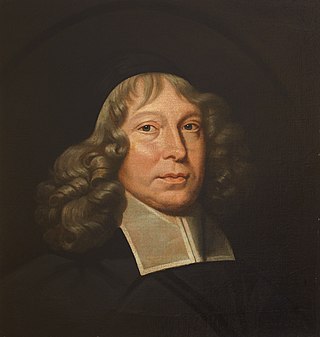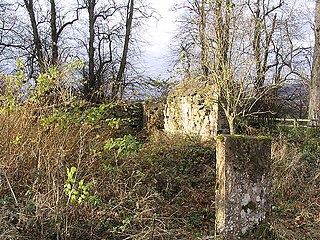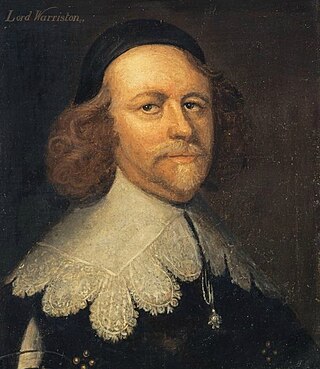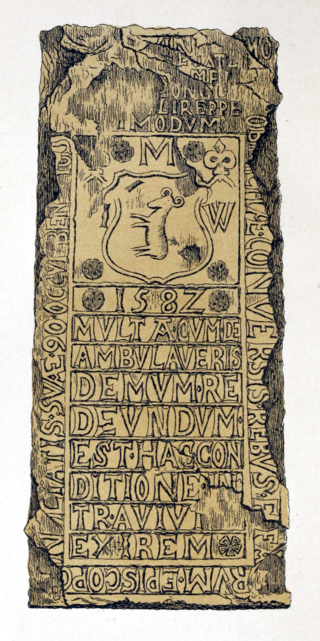Related Research Articles

Robert Rollock was Scottish academic and minister in the Church of Scotland, and the first regent and first principal of the University of Edinburgh. Born into a noble family, he distinguished himself during his education at the University of St Andrews, which led to him being appointed regent of the newly created college in Edinburgh in 1583, and its first principal in 1586.

Samuel Rutherford was a Scottish Presbyterian pastor and theologian and one of the Scottish Commissioners to the Westminster Assembly.

David Calderwood was a Church of Scotland minister and historian. Calderwood was banished for his nonconformity. He found a home in the Low Countries, where he wrote his great work, the Altare Damascenum. It was a serious attack on Anglican Episcopacy. Patiently and perseveringly Calderwood goes over the whole system, referencing the Bible, the Fathers, and the Canonists. Calderwood lived to see the principles for which he had suffered, and which he had defended, in complete ascendency. He was present at the Glasgow Assembly in 1638, and saw episcopacy and the high church liturgy swept away. He breathed his last at Jedburgh, a fugitive from his parish of Pencaitland; and they laid him in the churchyard of Crailing, where the first years of his ministry were spent.

Archibald Johnston, Lord Wariston was a Scottish judge and statesman.

Robert Pont (1529–1606) was a Church of Scotland minister, judge and reformer. He was a church minister and commissioner and a Senator of the College of Justice.

Robert Blair was a Scottish presbyterian minister who became a Westminster Divine and Moderator of the General Assembly of the Church of Scotland in 1646, after failing to emigrate to Boston in 1636. Born in Irvine in 1593, the sixth son of John Blair of Windyedge, a merchant-adventurer and cadet of Blair, and Beatrix Mure of the Rowallan family, he gained an MA at the University of Glasgow in 1612 and became regent there in 1615. When the episcopalian John Cameron was appointed Principal, Blair resigned and went to Ireland, to become minister of a Presbyterian congregation at Bangor, County Down. He was ordained for it by Robert Echlin, Bishop of Down and Connor, Blair was "very careful to inform... of what accusations had been laid against me of disaffection to the civil powers, whom he was the use of the English liturgy nor Episcopal government.... I declared my opinion fully to the Bishop at our first meeting... [who] said to me, 'I hear good of you, and will impose no conditions on you'". Echlin, however, turned against him. In September 1631, he was suspended from his ministry and on 4 May 1632 deposed. Though bent on emigrating to New England, the ship in which he and other ministers sailed was driven back by weather, a sign, Blair thought, that his services were still required at home. He dodged an order for his arrest by escaping to Scotland and was admitted to the Second Charge of Ayr in July 1638. After periods in Scotland and Ireland, he accompanied the Scottish army to England in 1640 and helped to negotiate the 1641 Peace of Ripon. In 1646, Blair was elected Moderator of General Assembly, then Chaplain-in-Ordinary to King Charles I. He was also on a committee endeavouring in 1648 to get Cromwell to establish "a uniformity of religion in England". He was summoned to London by Cromwell in 1654, but excused himself on grounds of ill health. On the establishment of episcopacy he was removed from his charges in September 1661, confined to Musselburgh, then to Kirkcaldy for three and a half years, and then to Meikle Couston, Aberdour, Fife, where he died on 27 August 1666 and was buried.
Robert Douglas (1594–1674) was the only minister of the Church of Scotland to be Moderator of the General Assembly five times.
John Douglas was Protestant Archbishop of St. Andrews from 1571 to 1574. As was tradition from the fifteenth to the seventeenth centuries, the Archbishop also took on the role of Chancellor of the University of St Andrews, as the University had strong links with the Pre-Reformation church.

John Winram was a 16th-century Scottish priest and ecclesiastical reformer. He was born in 1492, the son of one James Winram of Ratho and his wife Margaret Wilkie. He obtained a Bachelor's Degree (1515), a Master's Degree and a Doctorate (1541) from St Leonard's College, University of St Andrews.
John Durie (1537–1600) was one of the first Presbyterian ministers in Edinburgh after the Reformation in Scotland.
Walter Balcanquhall (1548–1617), was one of the first Presbyterian ministers in Edinburgh after the Reformation in Scotland.

David Fergusson or Ferguson was a Scottish reformer and minister of the Church of Scotland. He twice served as Moderator of the General Assembly of the Church of Scotland: 1573 and 1578.
John Nevay was a Scottish Covenanter. He was the nephew of Andrew Cant, minister of Aberdeen. He graduated with an M.A. from King's College, Aberdeen, in 1626. He worked as tutor to George, Master of Ramsay. He was licensed by the Presbytery of Dalkeith 14 October 1630 on the recommendation of that of Alford, but left its bounds a fortnight after. He was admitted about 1637 and appointed in 1647 a member of committee to revise the Psalter. He was present at Mauchline Moor in opposition to the royal army in June 1648. He was subsequently pardoned by Parliament on 16 January 1649. Nevay was appointed a commissioner by Parliament for visiting the University of Aberdeen 31 July 1649. He was active in raising the western army in 1650, and in 1651 a prominent supporter of the Protesters. In 1654 he was named by the Council of England on a committee for authorising admissions to the ministry in the province of Glasgow and Ayr. On 23 December 1662 he was banished by the Privy Council from His Majesty's dominions and went to Holland, where he died in 1672, aged about 66.

John Livingstone was a Scottish minister. He was the son of William Livingstone, minister of Kilsyth, and afterwards of Lanark, said to be a descendant of the fifth Lord Livingston. His mother was Agnes, daughter of Alexander Livingston, portioner, Falkirk, brother of the Laird of Belstane.

Robert MacWard, a covenanting minister, appears to have studied at the University of St. Andrews, where he was for some time regent of humanity. In 1654 he was appointed one of the regents of Glasgow University without competition on 4 August 1653, but resigned the appointment from ill-health, and on 8 September was ordained to the collegiate charge of the Outer High Church, Glasgow, the usual ordination trials being dispensed with. From 1656 to 1659 he had charge of the south district of the parish, in 1660 of the west, and in 1661 of the east. In 1659 he was named for the vice-chancellorship of the university, but the proposal, which was opposed by Robert Baillie, who seems always to have borne him a grudge, was unsuccessful.
James Durham was the eldest son of John Durham of Easter Powrie, north of Dundee. He was educated at University of St Andrews, and betook himself to the life of a country gentleman. While visiting his mother-in-law in the parish of Abercorn, he came under profound religious impressions in consequence of a sermon by Melvill, minister of Queensferry. Joining in the Civil War, he was promoted captain, and seriously exhorted and led the devotions of his company; this being noticed by Professor Dickson, he was induced to prepare himself for the ministry, a resolution which was hastened by two narrow escapes on the battlefield. He graduated M.A.. He was licensed for the ministry by the Presbytery of Irvine 18 May 1647. He was admitted to the congregation of Blackfriars 2 December 1647. Durham was appointed chaplain to the King July 1650. He called 4 September 1651, with charge of West Quarter of the city. He endeavoured, without success, to effect a union between the two contending parties in the Church in 1652. He died of consumption, 25 June 1658.
William Row (1563–1634) was a Scottish presbyterian divine.
John Spottiswood (1510–1585) was a religious reformer in 16th century Scotland.

James Lawson was the Church of Scotland minister who succeeded John Knox at St Giles' Cathedral in Edinburgh. Lawson's great educational achievement was the founding of the University of Edinburgh. He may be said to have been its principal promoter, and its best and wisest friend during the first year of its history, 1583.
James Carmichael (1542/3–1628) was the Church of Scotland minister and an author known for a Latin grammar published at Cambridge in September 1587 and for his work revising the Second Book of Discipline and the Acts of Assembly. In 1584, Carmichael was forced to seek shelter in England along with the Melvilles and others. Andrew Melville called him "the profound dreamer." Robert Wodrow said that "a great strain of both piety and strong learning runs through his letters and papers." Dr. Laing says there is every probability that " The Booke of the Universall Kirk " was compiled by Carmichael. The James Carmichaell collection of proverbs in Scots was published by Edinburgh University in 1957 which includes some proverbs also collected by David Ferguson.
References
- 1 2 Trevor Royle (1984). "Wodrow Society". Macmillan Companion to Scottish Literature. Macmillan International Higher Education. p. 318. ISBN 978-1-349-07587-4.
- ↑ Hugh James Rose (1857). A New General Biographical Dictionary. T. Fellowes. p. 521.